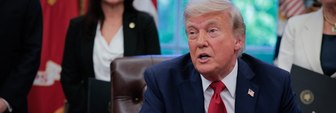With the 2022 congressional election concluding Tuesday on Election Day, the Economist/YouGov poll is publishing its final numbers for the generic congressional ballot: 49% of likely voters — including people who are undecided but lean for either the Democratic or the Republican Party candidates — say they will vote for the Republican Party candidate and 48% say they will vote for the Democratic candidate. The poll’s margin of error of about 3 percentage points is larger than the difference in preference, showing that national voter preference is narrowly divided and could shift in either direction.
Compared to Democrats who are registered voters, registered Republicans are more focused on this election in several ways. Republicans are more likely to be paying a lot of attention to the midterm elections, they are more likely to be enthusiastic about voting this year, and they are more likely to say they care about the outcome. Two-thirds of registered Republicans (66%) say they are paying "a lot" of attention to the congressional election, compared to 56% of registered Democrats. A majority of registered Republicans (59%) say that they are more enthusiastic than they usually are about voting in the congressional elections, compared with 48% of registered Democrats.
In addition, Republicans are going to the polls far more confident that they are on the winning side than Democratic voters are. Majorities of Republicans (59%) and of voters who say they will vote for GOP House candidates this year (63%) believe Republicans will be in control of both the House of Representatives and the Senate when the election is over. Just three in 10 Democrats (30%) — and the same share of voters who either have voted or plan to vote for Democrats — expect their party to maintain control of Congress. More Democratic voters (40%) expect the GOP to be in control of at least one chamber of Congress. Just 24% of Republicans expect that the Democrats will retain at least one chamber.
Likely voters are divided by party on what they're thinking about when making their choice. Three-quarters of likely voters (73%) say they are thinking "a lot" about the economy and 68% say the same about inflation/prices. Majorities are also thinking a lot about crime (59%), government spending (55%), and immigration (55%). Half (52%) are thinking a lot about abortion.
For Democratic likely voters, abortion ranks at the top of the list of 11 issues they were asked about. About seven in 10 (72%) say they are thinking a lot about abortion when voting. More than six in 10 Democratic voters (64%) have climate change on their minds and 61% cite guns. More than half of Democratic voters (55%) are thinking a lot about the economy, but fewer than half say the same about inflation (48%) or jobs (40%).
More than nine in 10 likely voters who are Republicans say they are thinking a lot about the economy (92%) when they cast their ballot this year and 91% say the same about inflation. About four in five are thinking a lot about each of the following longstanding Republican concerns: immigration (82%), crime (81%), and government spending (78%).
In general, voters in both parties are concerned about the state of the American economy: 57% of likely Democratic voters say the economy is in fair or poor shape, but that is far less than the 90% of GOP voters who say that. Republican voters are more than twice as likely as Democratic voters to believe the country is currently in a recession (83% vs. 35%), twice as likely to say that they have been personally affected “a lot” by inflation (71% vs. 36%), and more than twice as likely to expect inflation to be higher in six months (64% vs. 26%).
– Taylor Orth contributed to this article
Polling by the Economist/YouGov was conducted on November 3 - 6, 2022 among 1,500 U.S. adult citizens. Explore more on the Economist/YouGov methodology and data.
Image: Getty (Andrew Spear)









